Suidae
Suidae is a family of artiodactyl mammals which are commonly called pigs, hogs or boars. In addition to numerous fossil species, 18 extant species are currently recognized (or 19 counting domestic pigs and wild boars separately), classified into between four and eight genera. Within this family, the genus Sus includes the domestic pig, Sus scrofa domesticus or Sus domesticus, and many species of wild pig from Europe to the Pacific. Other genera include babirusas and warthogs. All suids, or swine, are native to the Old World, ranging from Asia to Europe and Africa.
| Suidae | |
|---|---|
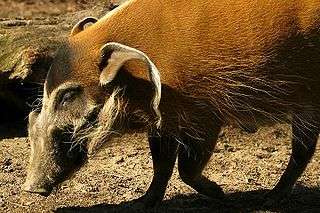 | |
| Red river hog (Potamochoerus porcus) | |
| Scientific classification | |
| Kingdom: | Animalia |
| Phylum: | Chordata |
| Class: | Mammalia |
| Order: | Artiodactyla |
| Suborder: | Suina |
| Family: | Suidae Gray, 1821 |
| Genera | |
|
Over 30 extinct genera, 6 extant, | |
The earliest fossil suids date from the Oligocene epoch in Asia, and their descendants reached Europe during the Miocene.[1] Several fossil species are known and show adaptations to a wide range of different diets, from strict herbivory to possible carrion-eating (in Tetraconodontinae).[2]
Physical characteristics
Suids belong to the order Artiodactyla, and are generally regarded as the living members of that order most similar to the ancestral form. Unlike most other members of the order, they have four toes on each foot, although they walk only on the middle two digits, with the others staying clear of the ground. They also have a simple stomach, rather than the more complex, ruminant, stomach found in most other artiodactyl families.[3]
They are small to medium animals, varying in size from 58 to 66 cm (23 to 26 in) in length, and 6 to 9 kg (13 to 20 lb) in weight in the case of the pygmy hog, to 130–210 cm (4.3–6.9 ft) and 100–275 kg (220–606 lb) in the giant forest hog.[4] They have large heads and short necks, with relatively small eyes and prominent ears. Their heads have a distinctive snout, ending in a disc-shaped nose. Suids typically have a bristly coat, and a short tail ending in a tassle. The males possess a corkscrew-shaped penis, which fits into a similarly shaped groove in the female's cervix.[5][6][7]
Suids have a well-developed sense of hearing, and are vocal animals, communicating with a series of grunts, squeals, and similar sounds. They also have an acute sense of smell. Many species are omnivorous, eating grass, leaves, roots, insects, worms, and even frogs or mice. Other species are more selective and purely herbivorous.[3]
Their teeth reflect their diet, and suids retain the upper incisors, which are lost in most other artiodactyls. The canine teeth are enlarged to form prominent tusks, used for rooting in moist earth or undergrowth, and in fighting. They have only a short diastema. The number of teeth varies between species, but the general dental formula is: 1–3.1.2–4.33.1.2.3.
Behavior and reproduction
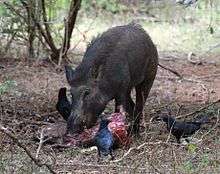
Suids are intelligent and adaptable animals. Adult females (sows) and their young travel in a group (sounder; see List of animal names), while adult males (boars) are either solitary, or travel in small bachelor groups. Males generally are not territorial, and come into conflict only during the mating season.
Litter size varies between one and twelve, depending on the species. The mother prepares a grass nest or similar den, which the young leave after about ten days. Suids are weaned at around three months, and become sexually mature at 18 months. In practice, however, male suids are unlikely to gain access to sows in the wild until they have reached their full physical size, at around four years of age. In all species, the male is significantly larger than the female, and possesses more prominent tusks.[3]
Classification
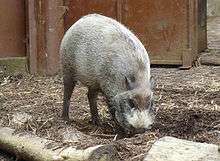
The following 18 extant species of suid are currently recognised:[8]
| Image | Genus | Living Species |
|---|---|---|
.jpg) | Sus – pigs |
|
| Porcula |
| |
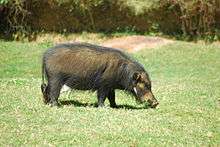 | Hylochoerus |
|
| Potamochoerus |
| |
_male.jpg) | Phacochoerus – warthog |
|
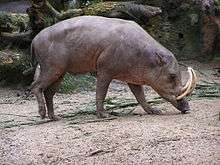 | Babyrousa – babirusa |
|
Taxonomy
A partial list of genera, with extinct taxa marked with a dagger "†",[2] are:
- Suidae
- Subfamily †Cainochoerinae
- Genus †Albanohyus
- Genus †Cainochoerus
- Subfamily †Hyotheriinae
- Genus †Aureliachoerus
- Genus †Chicochoerus
- Genus †Chleuastochoerus
- Genus †Hyotherium
- Genus †Nguruwe (formerly placed in Kubanochoerinae)[9][10]
- Genus †Xenohyus
- Subfamily †Listriodontinae[9]
- Tribe †Kubanochoerini
- Genus †Kubanochoerus (junior synonyms Libycochoerus, Megalochoerus)
- Tribe †Listriodontini
- Genus †Eurolistriodon
- Genus †Listriodon (junior synonym Bunolistriodon)
- Tribe †Namachoerini
- Genus †Lopholistriodon
- Genus †Namachoerus
- Tribe †Kubanochoerini
- Subfamily Suinae
- Tribe Suini
- Genus †Eumaiochoerus (Miocene)
- Genus †Hippopotamodon (Miocene to Pleistocene)
- Genus †Korynochoerus (Miocene to Pliocene)
- Genus †Microstonyx (Miocene)
- Genus Porcula
- Genus Sus (Miocene to Recent)
- Tribe Potamochoerini
- Genus †Celebochoerus (Pliocene to Pleistocene)
- Genus Hylochoerus (Pleistocene to recent)
- Genus †Kolpochoerus (Pliocene to Pleistocene)
- Genus Potamochoerus (Miocene to recent)
- Genus †Propotamochoerus (Miocene to Pliocene)
- Tribe †Hippohyini
- Tribe Phacochoerini
- Genus †Metridiochoerus (Pliocene to Pleistocene)
- Genus Phacochoerus (Pliocene to recent)
- Genus †Potamochoeroides (Pliocene, possibly Pleistocene)
- Genus †Stylochoerus (Pleistocene)
- Tribe Babyrousini
- Genus Babyrousa (Pleistocene to recent)
- Tribe Suini
- Subfamily †Tetraconodontinae
- Genus †Conohyus
- Genus †Notochoerus
- Genus †Nyanzachoerus
- Genus †Parachleuastochoerus
- Genus †Sivachoerus
- Genus †Tetraconodon
- Subfamily incertae sedis
- Genus †Hemichoerus
- Genus †Hyosus
- Genus †Kenyasus (formerly placed in Kubanochoerinae)[10]
- Genus †Palaeochoerus
- Genus †Schizochoerus[10]
- Genus †Sinapriculus[10]
- Subfamily †Cainochoerinae
References
- Palmer, D., ed. (1999). The Marshall Illustrated Encyclopedia of Dinosaurs and Prehistoric Animals. London: Marshall Editions. p. 269. ISBN 1-84028-152-9.
- Savage, RJG, & Long, MR (1986). Mammal Evolution: an illustrated guide. New York: Facts on File. pp. 212–213. ISBN 0-8160-1194-X.CS1 maint: multiple names: authors list (link)
- Cumming, David (1984). Macdonald, D. (ed.). The Encyclopedia of Mammals. New York: Facts on File. pp. 500–503. ISBN 0-87196-871-1.
- Bonnie S. Dunbar; M.G. O'Rand (29 June 2013). A Comparative Overview of Mammalian Fertilization. Springer Science & Business Media. pp. 330–. ISBN 978-1-4757-8982-9.
- Peter G. G. Jackson; Peter D. Cockcroft (2007). Handbook of Pig Medicine. Elsevier Health Sciences. ISBN 0-7020-2828-2.
- Virginia Douglass Hayssen; Ari Van Tienhoven (1993). Asdell's Patterns of Mammalian Reproduction: A Compendium of Species-specific Data. Cornell University Press. ISBN 0-8014-1753-8.
suidae penis.
- Wilson, Don E.; Mittermeier, Russell A., eds. (2011). Handbook of the Mammal Species of the World, vol. 2. Barcelona: Lynx Edicions. pp. 274–291. ISBN 8496553779.
- Maeva, J.O. (2009). "The differentiation of bunodont Listriodontinae (Mammalia, Suidae) of Africa: new data from Kalodirr and Moruorot, Kenya". Zoological Journal of the Linnean Society. 157 (3): 653–678. doi:10.1111/j.1096-3642.2008.00525.x.
- Maeva, J.O.; et al. (2010). "Phylogenetic relationships of the Suidae (Mammalia, Cetartiodactyla): new insights on the relationships within Suoidea". Zoologica Scripta. 39 (4): 315–330. doi:10.1111/j.1463-6409.2010.00431.x.
External links
| Wikispecies has information related to Suidae |
| Wikimedia Commons has media related to Suidae. |